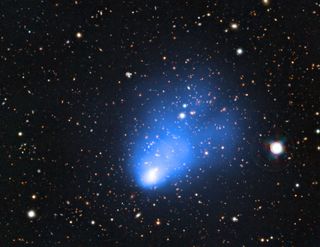AAS Dispatch: How to NOT Get Funded in the Astronomy World

AUSTIN, Texas — In an increasingly competitive environment for research grants from dwindling federal budgets, many scientists are eager for clues on how to secure funding.
The National Science Foundation, the U.S. government's arm for dispersing non-medical science research grants, has humorously shared a series of tongue-in-cheek tips on "How Not to Get Funded*" with the more than 2,700 astronomers gathered here for the 219th meeting of the American Astronomical Society. (The asterisk in the title reads: "May contain traces of sarcasm.")
Listed among the "Fastest Paths to Return-Without-Review" are:
- Not reading the NSF's Grant Proposal Guide: "Don't waste your time reading these documents. They're nothing but detailed descriptions of program objectives, proposal requirements, and formatting guidelines."
- Ignoring the broader impacts of your potential project: "Just because you're asking a federal agency for taxpayer dollars, that's no reason to address the agency's review criteria. Your brilliance transcends such petty concerns."
Among the humorous "8 Ways to Annoy Reviewers and Program Directors" are:
- Write for your friends: "Everybody is either already working in your area or wishing they could — there's no need to impress the latter. Jargon can be taken for granted."
- Show you care: "For a personal touch, refer to female graduates of your Ph.D. program as "Ms." Instead of "Dr." to emphasize your inclusiveness."
- Avoid unpleasantness: "Did you just get an email advising you to fix a problem in your submitted proposal? Ignore it! NSF gets so few proposals that they'll be grateful for yours no matter how non-compliant it is."
- Proofreading is for wimps: "Nobody equates typos and other errors with being sloppy. It's not like you're trying to convince anyone you can carry out a complex project."
You can follow SPACE.com assistant managing editor Clara Moskowitz on Twitter @ClaraMoskowitz. Follow SPACE.com for the latest in space science and exploration news on Twitter@Spacedotcom and on Facebook.
Get the Space.com Newsletter
Breaking space news, the latest updates on rocket launches, skywatching events and more!
Join our Space Forums to keep talking space on the latest missions, night sky and more! And if you have a news tip, correction or comment, let us know at: community@space.com.

Clara Moskowitz is a science and space writer who joined the Space.com team in 2008 and served as Assistant Managing Editor from 2011 to 2013. Clara has a bachelor's degree in astronomy and physics from Wesleyan University, and a graduate certificate in science writing from the University of California, Santa Cruz. She covers everything from astronomy to human spaceflight and once aced a NASTAR suborbital spaceflight training program for space missions. Clara is currently Associate Editor of Scientific American. To see her latest project is, follow Clara on Twitter.
